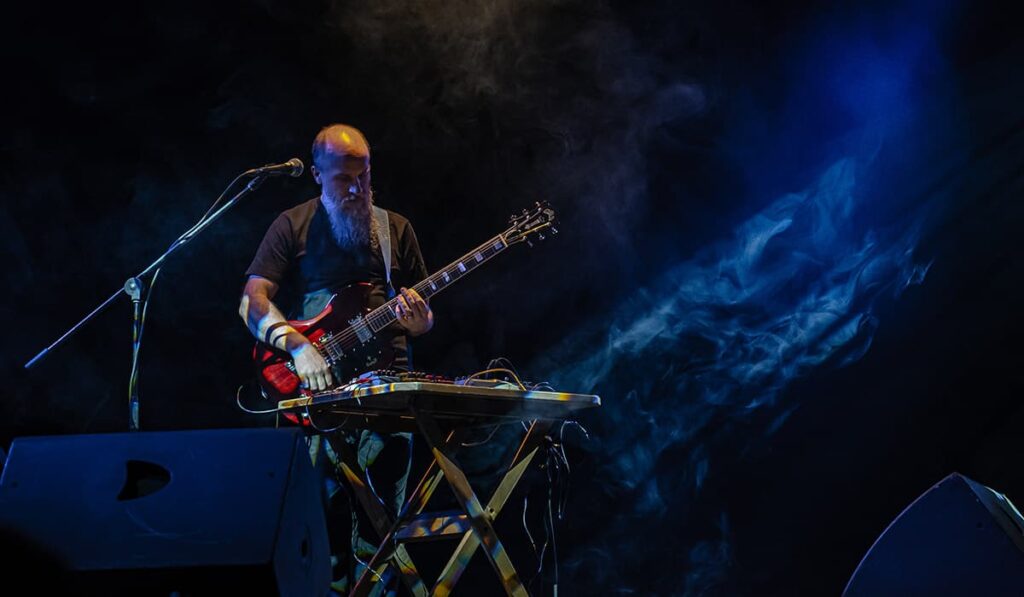
Aidan Baker is a Canadian artist who currently lives in Berlin. He is a composer with a versatile approach to music, using the electric guitar in unconventional ways to create experimental and ambient sounds. He has gained recognition as an extremely prolific artist, releasing numerous solo albums and participating in various musical initiatives. Although rooted in the ambient/experimental genre, Aidan Baker’s output draws inspiration from elements of rock, jazz, and other musical genres. He regularly performs on stages around the world, participating in prestigious music festivals such as Unsound and SXSW.
One of his most important musical endeavors is the experimental group Nadja, whose sounds are a fascinating fusion of ambient, drone, and doom metal. The band was formed in 2003 by Baker, and the addition of bassist Leah Buckareff in 2005 enriched the musical formation. Their production is characterized by hypnotic and slow songs that create a dense and mystical atmosphere. Nadja’s songs, which can stretch up to several tens of minutes, rarely contain vocals, emphasizing their instrumental depth and emotional intensity.
This interview was conducted with the participation of Przemek Król. Welcome!
Artur Mieczkowski
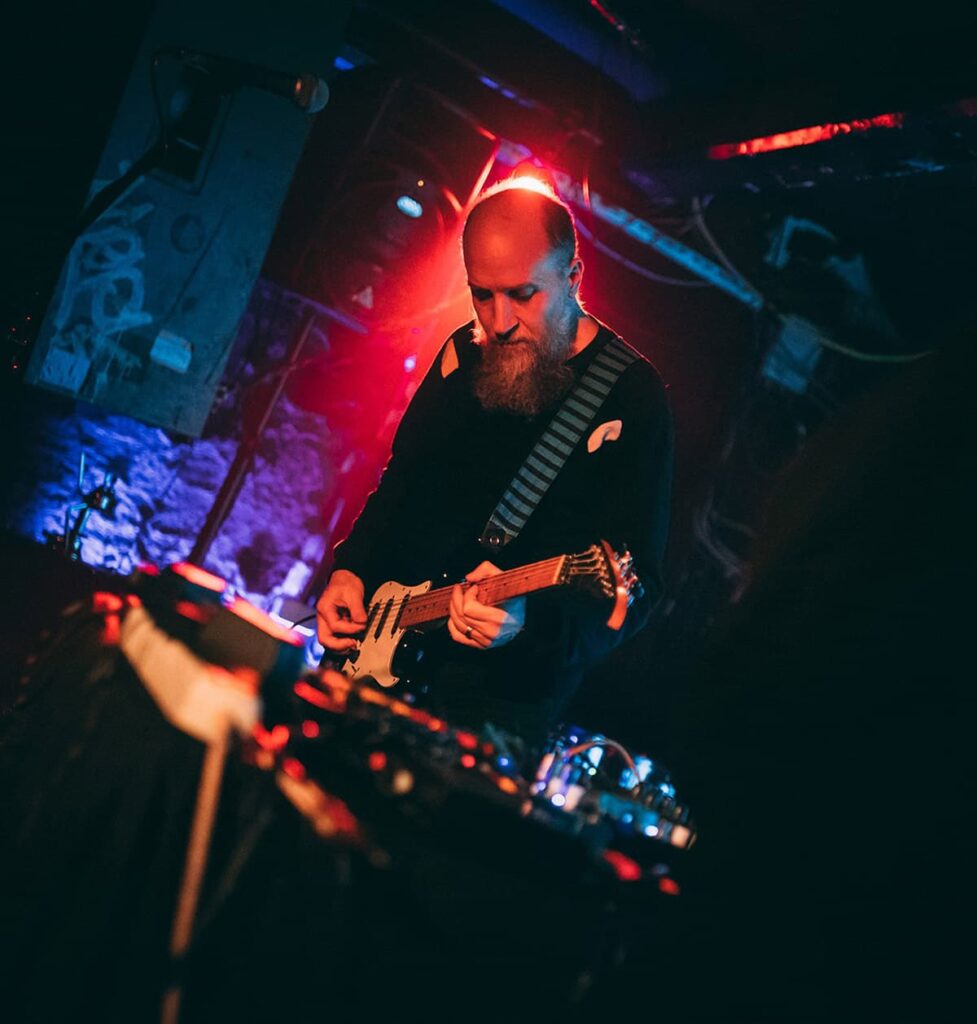
Artur Mieczkowski: Could you describe how you started your music career and what inspired you to pursue it?
Aidan Baker: I grew up in a musical family, so music is and was always part of my life. I don’t know that I always considered that I would have a career in music, but I started playing music from a very young age.
A.M.: What were the initial musical ideas behind the formation of the Nadja project?
A.B.: I was already making drone-based music under my own name, at this point, which was largely ambient and minimal, but I wanted to explore my interest in heavier, noisier sounds as well. I could have done this under my own name, of course, but it felt more appropriate to give the project another name in order to differentiate the two projects.
A.M.: Could you tell us more about your role as lead artist on the Nadja project and your collaboration with Leah Buckareff?
A.B.: Nadja was at first just myself and solely a studio project. Once the project started getting some attention and signed to Alien8 Recordings, there were demands for live performances. I did not feel that I could properly represent the project live performing alone so asked Leah if she would join the group on bass. This immediately changed the project, of course, making it more of a collaborative project, and certainly performing live changed and evolved our approach to songwriting and working together.
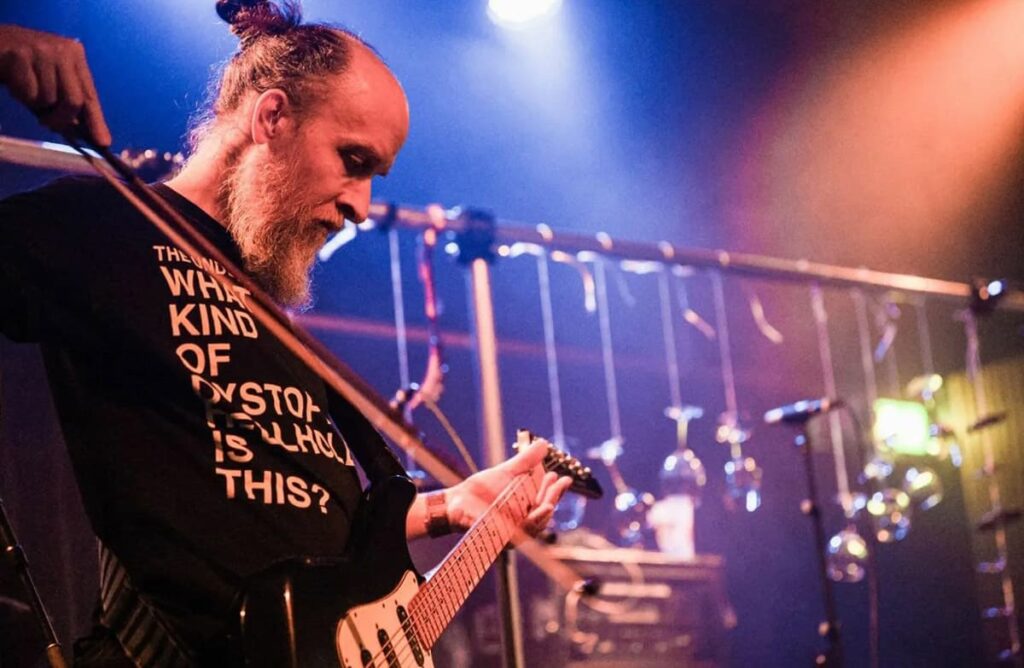
A.M.: What are the main characteristics of Nadja’s music, particularly in the context of combining ambient, drone, metal, and other genres?
A.B.: Nadja has generally been about combining elements of ambient and electronic music with the volume and structures of metal. We have taken different approaches in working with that combination, but we do have a sort of signature sound which we always try to incorporate somehow.
A.M.: How has your music’s sound and message evolved since the inception of the project?
A.B.: The project changed quite a bit when Leah first joined, as I mentioned previously. But also when we relocated to Berlin and began to play live much more than we had previously, that was another big evolutionary step, both in the way we presented our music live but also how we approached composition and working on albums.
A.M.: Do any specific inspirations or influences shape your musical compositions?
A.B.: It depends on the composition, inspiration or influence can come from a variety of sources; literature, films, artwork, even other music.
A.M.: Can you explain the music-making process behind the Nadja project, particularly the use of electronics and fragmented vocals alongside epic riffs and powerful percussion?
A.B.: Generally speaking, our songs start out as simple skeletal structures of simply a drum machine pattern and a guitar riff. This is then layered with additional sounds, often improvisational, until we feel like a certain level of completion has been reached. That is largely an intuitive process – simply, the song must eventually feel complete, feel right.
A.M.: Do any particular themes or concepts frequently arise in your musical compositions?
A.B.: Some recurring themes: body horror, first contact, parasites, mycology, sublimation, transcendence.
A.M.: What are your favorite memories of making music as part of the Nadja project?
A.B.: That is kind of difficult to pinpoint…there are so many…our recent tour in Mexico was a highlight, since we had never been there before, and it was great to see some of the country and connect with our fans there.
A.M.: The origin of the project’s name is interesting. It is your name spelled backwards with the ‘i’ replaced with a ‘j’, which alludes to a book by André Breton. What inspired you to create the name of your project?
A.B.: Breton’s book is about identity, so the notion that the Nadja project was the inverse or flipside of my identity – musically, personally – seemed appropriate.
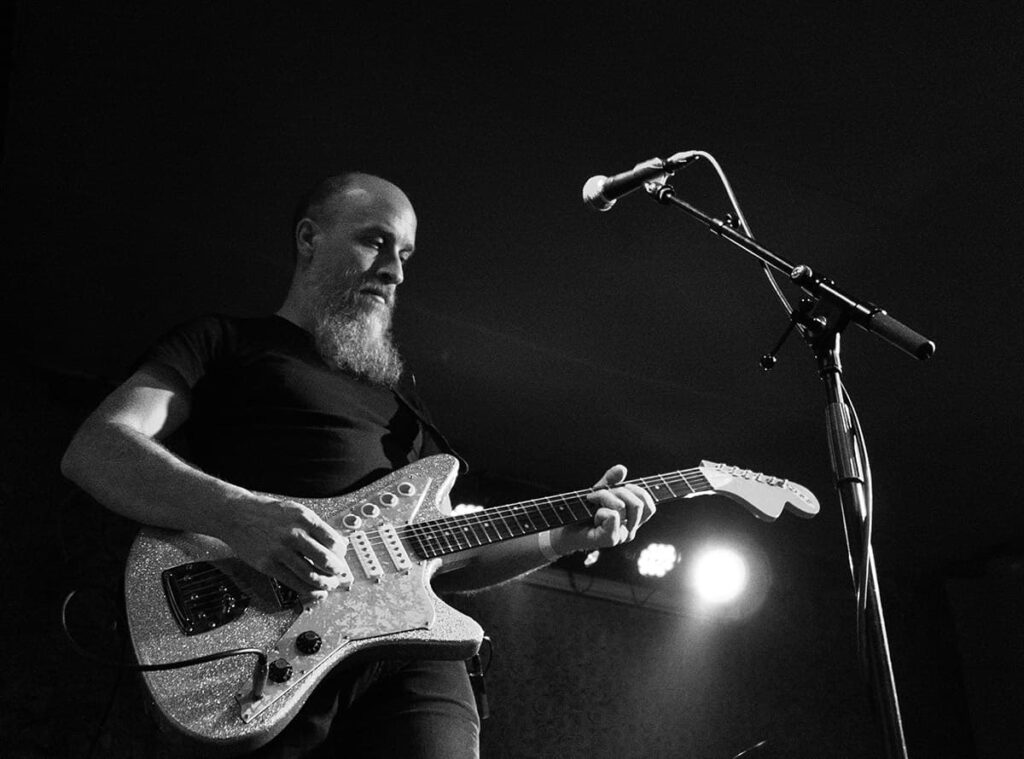
A.M.: Literature is a primary source of inspiration for your creative work. What aspects of literature do you find most inspiring, and how do you translate those elements into the language of sound?
A.B.: Literary inspiration can range from simply the imagistic to more concrete theories and themes. Sometimes, we attempt to express that imagistic inspiration sonically, other times we simply suggest a thematic inspiration as a means of guiding listeners’ interpretations of the music.
A.M.: How does the sound and message of your music differ from your other projects?
A.B.: We generally try to use our signature sound with Nadja releases. That is not always the case and sometimes that sound appears in other projects of mine, but Nadja has a specific aesthetic – sonically, thematically. I have other projects to explore different sounds and methodologies.
A.M.: What inspired you to start your solo music career, and why did you choose the electric guitar as your primary instrument?
A.B.: I started playing guitar as a teenager, mostly in response to my studies in flute. Performing with the flute normally required being part of an ensemble or having an accompanyest, which I found limiting after awhile. Guitar was self-contained and could be performed solo. To a certain extent, as my music and performative techniques became more deconstructive, I was attempting to create the sounds of an ensemble as an individual.
Przemek Król: Could you tell us a little bit about your guitars, amplifiers, effects and other pieces of your studio and concert equipment that are important to you? Have developments in guitar technology in recent years in any way influenced what equipment you use? Miniaturization and modeling means that touring doesn’t necessitate taking heavy amplifiers and speakers with you and therefore, in some cases, an extra crew. On the other hand, many musicians still use traditional amplifiers, if only to fill the stage with sound. Do you struggle with this type of dilemma?
A.B.: Nadja originally used amplifiers on stage, but we soon abandoned them and began to use just the PA for our performances. This was in part due to frustration with sound engineers who did not understand what we were trying to do, and allowed us to take more control over what we presented to the audience, but also gave us more frequency range which allowed us to more effectively reproduce our sound in a live setting. This certainly makes touring easier and has allowed us to travel places where other bands might have difficulties. That said, we do not always get the proper technical equipment – a high quality PA system, for example – that we require to perform, so that can be a challenge.
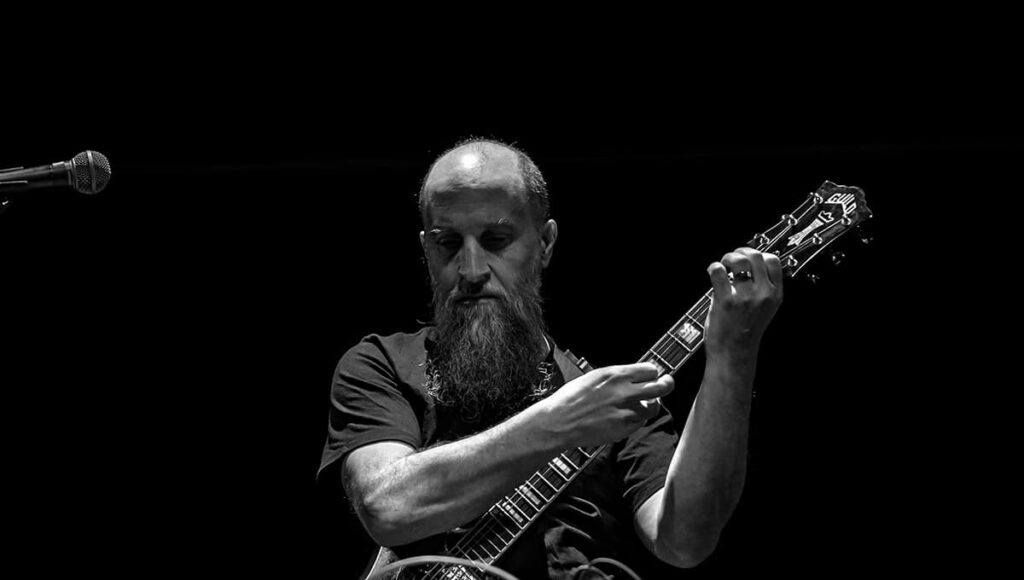
P.K.: How do you deal with presenting a wider instrumentation on stage (percussion, for example) with – as in the case of Nadja – only a two-person line-up? Do you use drum machines / samplers?
A.B.: The drum tracks are pre-recorded and simply played back for live performances. The drums are a combination of electronic and analog sounds, mixed and sequenced in a way to obfuscate or disguise their nature, to suggest a certain humanness, even if the source is primarily drum machine.
P.K.: Does your equipment inspire you? Do you collect musical gear or is it simply a set of tools for you?
A.B.: Equipment is mostly a tool. We have some favourite pedals, of course, but they are not something that we really collect or fetishize.
A.M.: Please share your experiences of recording and releasing music on independent labels such as Gizeh Records, Important Records, Alien8 Recordings, and your own label Broken Spine Productions.
A.B.: We are quite DIY in our methods so it is important for us to work with labels operating in a similar way. The music industry can be quite toxic, so working with people of similar mindset, with similar values, is a way to maintain and persevere, even if it means remaining in the underground and perhaps missing out on certain opportunities.
A.M.: How do your Toronto roots influence your music, and does the atmosphere of Berlin, where you currently reside, also impact your creative process?
A.B.: When Nadja began playing more live shows, we were working with a Montreal label, so we actually played Montreal more often than Toronto. The scene in Montreal at that time seemed more supportive or interested in what we were doing at the time, so even though we were active in the Toronto scene, we were often identified as a Montreal band. Moving to Berlin allowed us to focus solely on a musical career and, as such, the project evolved considerably as we toured and performed much more than we had been able to in Canada. Berlin of course has changed a lot in recent years, but it is still quite a creative city with many musicians and lots of music happening, so it is still an inspiring place to live.
A.M.: Can you name some of your favorite musical projects, apart from your solo career, and describe your involvement in them?
A.B.: Hypnodrone Ensemble is always a fun project to play with, as it is about abandon and freedom. I have a new trio project called Tavare which is more slowcore/shoegaze directed. As a more song-oriented project, this has been good for me in terms of working on composition and not relying solely on improvisation.
A.M.: How does your classical music education experience influence your work in experimental and ambient music contexts?
A.B.: I think any musical education will help one express one’s self musically. The fact that I started with classical music and moved into experimental / ambient music is somewhat irrelevant, in my mind – it is merely a set of tools which I chose to adapt in a certain way.
A.M.: Do you have any preferred instruments or elements that you enjoy experimenting with in your music, aside from the electric guitar?
A.B.: I use all sorts of instruments, whatever I feel will facilitate what I want to express…guitar is simply my default and what I use most often, but it is merely a tool of expression.
A.M.: Do you intend to collaborate with other artists in the future? If yes, what types of projects would you like to explore?
A.B.: Yes, of course, I am always open to collaboration. Collaboration for me is about going to new and unexpected places, so less about exploring specific ideas and more about spontaneity and newness.
A.M.: Can you discuss the concept behind the Hypnodrone Ensemble project? I attended your performance with Otayonii and An Eagle in your Mind in Poland, specifically at the Desdemona in Gdynia, and was thoroughly impressed.
A.B.: Eric Quach (aka Thisquietarmy) and I started Hypnodrone Ensemble partly to subvert people’s expectations of what ambient/drone music could be. While we are still very much drone-based, by adding multiple drummers and a polyrhythmic element, the project explored krautrock and spacerock as much as it did ambient/experimental music, even as it combined elements of both. The line-up has shifted and changed over the years, and accordingly the sonic direction has shifted, but I think the project still has a distinct sonic aesthetic.
A.M.: With so many projects and albums recorded, do you not feel burnt out? How do you manage to maintain such high levels of energy across so many creative fronts?
A.B.: Yes, sometimes I feel burnt out. Sometimes I don’t touch an instrument for quite some time. But the creative process, the act of working on something, creating something, can be inspiring in and of itself.
A.M.: What are the main differences between your creative process as a musician and as an author of poetry books? Do the two worlds intersect in any way?
A.B.: The worlds are relatively separate, although my next literary project, coming out later this year with The Garotte, is a novel with an accompanying musical soundtrack. But generally speaking writing for me is a much more laboured, intellectually rigorous process compared to music which is much more spontaneous and intuitive. I do write song lyrics, of course, which brings the two practices together to a certain degree, but as lyrics are merely a part of a whole, they do not have to be as self-contained or self-supporting as poetry.
A.M.: What are your publication plans? When will the sequel to Labyrinthine Nadja be released?
A.B.: There are some new songs circling through my head right now but I have not yet had a chance to try and capture them… but hopefully soon and then we might have a new album in 2025…
A.M.: Thank you for the interview. I look forward to your upcoming releases with great interest.
A.B.: Thanks to you.